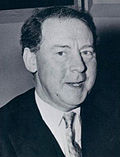List of treasurers (1903–present)
- Note: the right-hand column does not allocate height proportional to time in office.
A list of Treasurers since 1903.
| Profile | Term began | Term ended | Leader(s) | |||
|---|---|---|---|---|---|---|
| 1 | Arthur Henderson (1863–1935) (1st time) |  | 1903 | 1912 | None | |
| Hardie | ||||||
| Himself | ||||||
| Barnes | ||||||
| MacDonald (himself) | ||||||
| 2 | Ramsay MacDonald (1866–1937) |  | 1912 | 1929 | ||
| Henderson | ||||||
| Adamson | ||||||
| Clynes | ||||||
| MacDonald (himself) | ||||||
| (1) | Arthur Henderson (1863–1935) (2nd time) |  | 1929 | 1936 | ||
| Himself | ||||||
| Lansbury | ||||||
| Attlee | ||||||
| 3 | George Lathan | 1936 | 1943 (died in office) | |||
| 4 | Arthur Greenwood |  | 1943 | 1954 | ||
| 5 | Hugh Gaitskell |  | 1954 | 1956 | ||
| Morrison (acting) | ||||||
| Gaitskell | ||||||
| 6 | Aneurin Bevan |  | 1956 | 1960 | ||
| 7 | Harry Nicholas | 1960 | 1965 | |||
| Brown (acting) | ||||||
| Wilson | ||||||
| 8 | Dai Davies | 1965 [4] | 1967 | |||
| 9 | James Callaghan |  | 1967 | 1976 | ||
| 10 | Norman Atkinson | 1976 | 1981 | Callaghan | ||
| Foot | ||||||
| 11 | Eric Varley | 1981 | 1983 | |||
| 12 | Albert Booth | 1983 | 1984 | Kinnock | ||
| 13 | Sam McCluskie | 1984 | 1992 | |||
| 14 | Tom Burlison | 1992 | 1996 | Smith | ||
| Beckett (acting) | ||||||
| Blair | ||||||
| 15 | Margaret Prosser |  | 1996 | 2001 | ||
| 16 | Jimmy Elsby | 2001 | 2004 | |||
| 17 | Jack Dromey [5] |  | 2004 | 2010 | ||
| 18 | Diana Holland | 2010 | 2022 | Brown | ||
| Harman (acting: 1st time) | ||||||
| Miliband | ||||||
| Harman (acting: 2nd time) | ||||||
| Corbyn | ||||||
| Starmer | ||||||
| 19 | Mike Payne | 2022 | Incumbent | |||